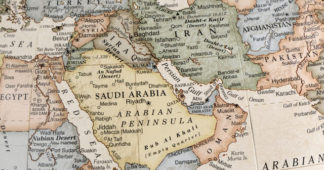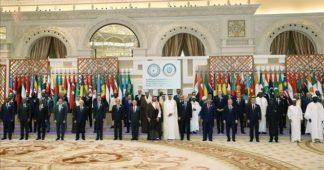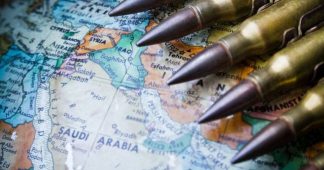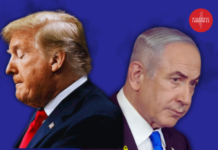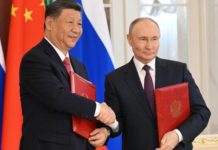By Marwan Emil Toubassi*
For nearly seven decades, Arab countries have experienced a series of cumulative defeats following their supposed independence. These defeats extend beyond military conflicts, deeply affecting the Arab nationalist project. They are not merely the result of colonial schemes or Israeli dominance but also stem from internal crises and political and economic failures caused by the ruling regimes. Today, we face a reality that demands recognition of the problem’s magnitude before seeking solutions.
The Mashreq Arab states have, for decades, been subjected to continuous attempts to dismantle their political, economic, and social structures. These efforts are part of an advanced stage of the renewed colonial project led by the United States and Israel. This project seeks not only to reshape the region’s map but also to undermine and defeat the role of the modern nation-state, which emerged after Arab independence. Since then, these states have faced Western-imposed sanctions and subjugation attempts in the absence of a unified and responsible Arab democratic opposition, despite the suppression it has endured.
In the post-independence era, Arab nation-states carried the hopes of their people for unity and autonomy. However, these hopes quickly faded due to several factors:
1. Political Authoritarianism: Dominance by ruling parties, repeated military coups, and personal or partisan rivalries eroded democracy and social justice, leaving states more vulnerable to external pressures.
2. Failure to Confront Israel: Despite recurring wars and conflicts, Arab states failed to curb Israel’s expansionist colonial ambitions in historic Palestine and beyond.
3. Lack of Economic Independence and Development: These states failed to build strong, independent economies that could ensure dignity for their citizens. Despite vast natural and human resources, they could not establish an economic base capable of withstanding crises. This failure, coupled with poverty, unemployment, and the absence of justice, weakened social cohesion and eroded trust between the state and its citizens.
4. Lack of a Unified Vision on the Israeli Conflict: Ruling regimes prioritized personal or partisan interests over national priorities.
5. Normalization and Political Bias: The rush of some states toward normalizing ties with Israel weakened the unified Arab front and granted Israel regional legitimacy.
Under these conditions, the so-called “New Middle East” appears to be a calculated plan aimed at creating weak and fragile entities devoid of sovereignty and independent decision-making, ensuring continued Western and Israeli dominance. This is evident in ongoing Israeli strikes on Syria and the occupation of its territories.
The systematic dismantling of national states and the insistence on their defeat have become key tools in executing this plan. Syria and Iraq have been at the forefront, where armed conflicts and sectarian and ethnic divisions were exploited to weaken these nations. Such divisions were not merely internal byproducts but were fueled and sustained by regional distractions, diverting focus from the central enemy of the Arab cause. The goal was clear: to prevent any Arab state from emerging as a regional power capable of challenging Israeli or American interests.
In this chaos, strategies for redrawing regional maps have emerged. What began as the “Arab Spring” gradually transformed into a project to divide states into smaller, conflicting entities dependent on colonial powers. This model reinforces Israeli hegemony, making it the most stable and influential power in a fragmented region.
Normalization with Israel has become a strategic goal of this project. Arab states are pressured into abandoning their stances on the Palestinian cause, using chaos as a threat to weaken any unified Arab front or relatively stable entity. This forces states to make political and economic concessions, transforming Israel into a regional partner while exploiting resources, particularly gas and energy, despite ongoing occupation and escalating crimes against Palestinians.
Simultaneously, armed groups, particularly Islamist ones, have been used as effective tools to drain Arab states. Whether supported or confronted, these groups force central governments to divert resources from development projects to military and security expenditures. This continuous depletion weakens states and makes them more vulnerable to external pressures.
The ongoing genocide in Gaza exemplifies another aspect of this strategy. With explicit American support, Israel exploits regional conflicts to impose its vision, while Washington obstructs efforts to halt the aggression under the guise of a ceasefire. These policies perpetuate instability in the region, serving Israeli interests at the expense of the peoples’ security and future.
Meanwhile, regional powers like Iran and Turkey occupy conflicting positions. Despite their attempts to assert influence, their handling of crises often fuels rather than resolves regional divisions, as seen in Turkey’s annexation of northern Syrian territories. Major powers like Russia and China, despite their growing presence, remain preoccupied with their own internal and external challenges, delaying their ability to effectively counter American dominance in the region.
Given these dynamics, the future seems bleak unless the accelerating drivers of chaos are halted. However, this scenario remains likely for other neighboring Arab countries, given the Zionist agenda.
All of this points to an ominous outlook. If this trajectory continues unchecked, it will lead to more authoritarianism, societal homogenization, and enforced conformity, particularly in Syria and other countries.
What is urgently needed today is a new strategy that restores the concept of the modern civic nation-state and strengthens internal unity in affected countries. Conscious regional alliances capable of transcending sectarian and ethnic divisions could help restore balance to the region. Leveraging international shifts, such as the rising influence of China and Russia, could enhance the region’s ability to resist Western hegemony.
Yet the question remains: Do Arab and Islamic states possess the political will and popular awareness to dismantle this scheme? The answer will shape the Middle East’s future for decades to come. Betting on chaos is no longer an option but an existential threat requiring genuine confrontation and radical solutions to restore the region’s sovereignty and stature.
Defeat is not an inevitable fate. However, acknowledging it is the first step toward overcoming it. Rebuilding the nation-state demands political and popular will capable of dismantling colonial schemes while correcting internal paths. Another pressing question emerges: Will we face the truth courageously, or will we continue in a cycle of failure, chasing illusions, and denying reality? The answer will also determine the future of the Palestine Liberation Organization and the Palestinian people for decades to come.
* Former Ambassador of Palestine to Greece
We remind our readers that publication of articles on our site does not mean that we agree with what is written. Our policy is to publish anything which we consider of interest, so as to assist our readers in forming their opinions. Sometimes we even publish articles with which we totally disagree, since we believe it is important for our readers to be informed on as wide a spectrum of views as possible.
